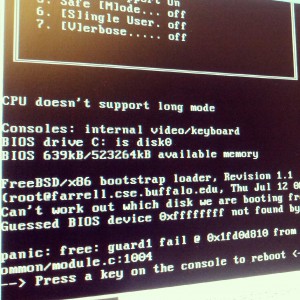My system looks like this:
$ uname -a
FreeBSD xxxx.xxx.net 9.0-RELEASE FreeBSD 9.0-RELEASE #0: Tue Jan 3 07:46:30 UTC 2012 [email protected]:/usr/obj/usr/src/sys/GENERIC amd64
-
Install qemu from /usr/ports/emulators/qemu
-
Load following 2 modules:
$ sudo kldload aio $ sudo kldload kqemu
-
Get iso of the guest OS, in my case its FreeBSD so I got one from: ftp://ftp.freebsd.org/pub/FreeBSD/releases/ISO-IMAGES/9.1/
-
Create qemu image: (‘man 1 qemu-img’ for more information)
$ qemu-img create -f qcow2 ~/qemu/fbsd9_1beta.img 8G
$ ls -l ~/qemu/ total 652448 -rw-r–r– 1 hpanchasara hpanchasara 667693056 Aug 7 12:43 FreeBSD-9.1-BETA1-amd64-disc1.iso -rw-r–r– 1 hpanchasara hpanchasara 262144 Aug 7 12:44 fbsd9_1beta.img
Then I tried to launch it with: (‘man 1 qemu’ for more information)
$ qemu -boot d -hda ~/qemu/fbsd9_1beta.img -m 512M -cdrom ~/qemu/FreeBSD-9.1-BETA1-amd64-disc1.iso -localtime
But got following errors:
 Listing a few to help the web-crawler which intern helps some lost soul like me:
“CPU doesn’t support long mode”
“Can’t work out which disk we are booting from…”
“panic: free: guard1 fail @ …”
Listing a few to help the web-crawler which intern helps some lost soul like me:
“CPU doesn’t support long mode”
“Can’t work out which disk we are booting from…”
“panic: free: guard1 fail @ …”
Asking “the Internet” helped me narrow down the root causes to following:
-
32 bit host cannot have 64 bit guest – which was not the case for me.
-
Machine should be virtualization capable – it is. from /var/run/dmesg.boot, it should have VMX or SVM under “Features”.
FreeBSD 9.0-RELEASE #0: Tue Jan 3 07:46:30 UTC 2012 [email protected]:/usr/obj/usr/src/sys/GENERIC amd64 CPU: Intel(R) Core(TM) i7-2600K CPU @ 3.40GHz (3392.37-MHz K8-class CPU) Origin = “GenuineIntel” Id = 0x206a7 Family = 6 Model = 2a Stepping = 7 Features=0xbfebfbff Features2=0x179ae3bf AMD Features=0x28100800 AMD Features2=0x1 TSC: P-state invariant, performance statistics
-
Virtualization support should be enabled in bios – it was enabled.
$ sudo dmidecode | grep VME VME (Virtual mode extension)
-
Use of incorrect qemu binary – that was the culprit.
“qemu” has different binary versions depending on the platform/systems:
$ qemu
qemu qemu-system-mips qemu-system-ppcemb
qemu-img qemu-system-mips64 qemu-system-sh4
qemu-system-arm qemu-system-mips64el qemu-system-sh4eb
qemu-system-cris qemu-system-mipsel qemu-system-sparc
qemu-system-m68k qemu-system-ppc qemu-system-sparc64
qemu-system-microblaze qemu-system-ppc64 qemu-system-x86_64
Using following I could successfully launch the guest FreeBSD instance:
$ qemu-system-x86_64 -boot d -hda ~/qemu/fbsd9_1beta.img -m 512 -cdrom ~/qemu/FreeBSD-9.1-BETA1-amd64-disc1.iso -localtime
On this first launch, it does FreeBSD install from the specified iso to the .img file. This is a typical FreeBSD installation process.
One the installation is done, you I could launch the VM via:
$ qemu-system-x86_64 -boot c -hda ~/qemu/fbsd9_1beta.img